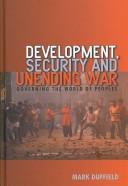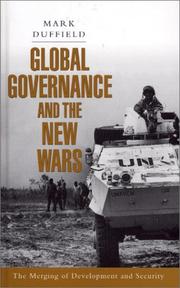| Listing 1 - 10 of 17 | << page >> |
Sort by
|

ISBN: 9780745635798 9780745635804 Year: 2007 Publisher: Cambridge Polity
Abstract | Keywords | Export | Availability | Bookmark
 Loading...
Loading...Choose an application
- Reference Manager
- EndNote
- RefWorks (Direct export to RefWorks)
Polemology --- Economic assistance --- Security, International --- Aide économique --- Sécurité internationale --- Political aspects. --- Economic aspects. --- Aspect politique --- Aspect économique --- Aide économique --- Sécurité internationale --- Aspect économique --- Collective security --- International security --- International relations --- Disarmament --- International organization --- Peace --- Political aspects --- Economic aspects

ISBN: 1856497488 1856497496 9781856497480 9781856497497 Year: 2005 Publisher: London Zed books
Abstract | Keywords | Export | Availability | Bookmark
 Loading...
Loading...Choose an application
- Reference Manager
- EndNote
- RefWorks (Direct export to RefWorks)
853 Regionale conflicten --- Sécurité nationale --- Sécurité nationale --- Globalization. --- National security --- War --- Economic aspects --- Globalization --- Armed conflict (War) --- Conflict, Armed (War) --- Fighting --- Hostilities --- Wars --- International relations --- Military art and science --- Peace --- Global cities --- Globalisation --- Internationalization --- Anti-globalization movement --- International relations. Foreign policy --- Polemology --- Third World: economic development problems --- Guerre --- Mondialisation --- Aspect économique --- Developing countries: economic development problems --- War - Economic aspects - Developing countries --- National security - Developing countries
Book
ISBN: 0903715295 Year: 1990 Publisher: Brighton University of Sussex. Institute of development studies
Abstract | Keywords | Export | Availability | Bookmark
 Loading...
Loading...Choose an application
- Reference Manager
- EndNote
- RefWorks (Direct export to RefWorks)
Digital
ISBN: 9788776056490 9788776056506 Year: 2013 Publisher: Copenhagen Danish Institute for International Studies
Abstract | Keywords | Export | Availability | Bookmark
 Loading...
Loading...Choose an application
- Reference Manager
- EndNote
- RefWorks (Direct export to RefWorks)
Book
ISBN: 9780745698595 074569859X 9780745698588 0745698581 Year: 2019 Publisher: Medford, MA Polity
Abstract | Keywords | Export | Availability | Bookmark
 Loading...
Loading...Choose an application
- Reference Manager
- EndNote
- RefWorks (Direct export to RefWorks)
The world has entered an unprecedented period of uncertainty and political instability. Faced with the challenge of knowing and acting within such a world, the spread of computers and connectivity, and the arrival of new digital sense-making tools are widely celebrated as helpful. But is this really the case or have we lost more than gained in the digital revolution? In Post-Humanitarianism: Governing Precarity in the Digital World renowned scholar of development, security and global governance Mark Duffield offers an alternative interpretation. He contends that connectivity embodies new forms of behavioural incorporation, cognitive subordination and automated management that are themselves inseparable from the emergence of precarity as a global phenomenon. Rather than reconstruct from disasters, survivors are encouraged to build 'resilience' - to adapt and make do with what remains. As an outcome of an economy now in permanent emergency, humanitarian disasters function as a site for trialling and anticipating the modes of social automation and remote management that govern this precarity and increasingly embrace us all. Empirically rich and conceptually innovative, Post Humanitarianism critically explores how increasing connectivity is inseparable from growing societal polarisation, anger and political push-back. It will be essential reading for students of international and social critique, together with anyone concerned about our deepening alienation from the world.
Humanitarian intervention --- Humanitarianism --- Technology --- Developing countries --- Social aspects --- Social conditions --- Economic conditions
Book
ISBN: 9781780325606 Year: 2014 Publisher: London Zed Books
Abstract | Keywords | Export | Availability | Bookmark
 Loading...
Loading...Choose an application
- Reference Manager
- EndNote
- RefWorks (Direct export to RefWorks)

ISBN: 1780325606 1780329822 1780329814 9781780329819 9781780329826 9781350220430 1350220434 9781780325606 9781856497480 Year: 2014 Publisher: London
Abstract | Keywords | Export | Availability | Bookmark
 Loading...
Loading...Choose an application
- Reference Manager
- EndNote
- RefWorks (Direct export to RefWorks)
In this hugely influential book, originally published in 2001 but just as - if not more - relevant today, Mark Duffield shows how war has become an integral component of development discourse. Aid agencies have become increasingly involved in humanitarian assistance, conflict resolution and the social reconstruction of war-torn societies. Duffield explores the consequences of this growing merger of development and security.
Globalization. --- National security -- Developing countries. --- War -- Economic aspects -- Developing countries. --- Business & Economics --- Economic History --- War --- National security --- Economic aspects --- Global cities --- Globalisation --- Internationalization --- Armed conflict (War) --- Conflict, Armed (War) --- Fighting --- Hostilities --- Wars --- International relations --- Anti-globalization movement --- Military art and science --- Peace --- Globalization --- E-books
Book
Abstract | Keywords | Export | Availability | Bookmark
 Loading...
Loading...Choose an application
- Reference Manager
- EndNote
- RefWorks (Direct export to RefWorks)
Book
ISBN: 9781847010117 1847010113 9781846157172 1847010776 9786612988189 184615717X 1282988182 Year: 2009 Publisher: Woodbridge, Suffolk ; Rochester, N.Y. : James Currey,
Abstract | Keywords | Export | Availability | Bookmark
 Loading...
Loading...Choose an application
- Reference Manager
- EndNote
- RefWorks (Direct export to RefWorks)
The parallels between the language of nineteenth-century liberal imperialism and the humanitarian interventionism of the post-Cold War era are striking. The American military, both in Somalia in the early 1990s and in the aftermath the Iraq invasion, used ethnographic information compiled by British colonial administrators. Are these interconnections, which are capable of endless multiplication, accidental curiosities or more elemental? The contributors to this book articulate the belief that these comparisons are not just anecdotal but are analytically revealing. From the language of moral necessity and conviction, the design of specific aid packages; the devised forms of intervention and governmentality, through to the life-style, design and location of NGO encampments, the authors seek to account for the numerous and often striking parallels between contemporary international security, development and humanitarian intervention, and the logic of Empire. MARK DUFFIELD is Professor of Development Politics at the University of Bristol; VERNON HEWITT is Senior Lecturer in Politics at the University of Bristol.
Colonies --- Humanitarian intervention --- International relations --- Droit d'ingérence humanitaire --- Relations internationales --- Administration --- History --- Decision making --- Histoire --- Prise de décision --- #SBIB:327.4H21 --- #SBIB:39A4 --- Kolonisatie / dekolonisatie / post-kolonisatie --- Toegepaste antropologie --- Droit d'ingérence humanitaire --- Prise de décision --- Coexistence --- Foreign affairs --- Foreign policy --- Foreign relations --- Global governance --- Interdependence of nations --- International affairs --- Peaceful coexistence --- World order --- National security --- Sovereignty --- World politics --- Intervention (International law) --- Anti-colonialism --- Colonial affairs --- Colonialism --- Neocolonialism --- Imperialism --- Non-self-governing territories --- Colonization --- History.
Digital
Year: 1998 Publisher: New York, N.Y. Policy, Information and Advocacy Division, Office for the Coordination of Humanitarian Affairs, United Nations
Abstract | Keywords | Export | Availability | Bookmark
 Loading...
Loading...Choose an application
- Reference Manager
- EndNote
- RefWorks (Direct export to RefWorks)
| Listing 1 - 10 of 17 | << page >> |
Sort by
|

 Search
Search Feedback
Feedback About UniCat
About UniCat  Help
Help News
News